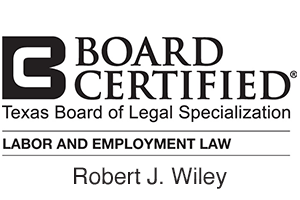in Austin, Texas
Free Speech
Rob Wiley: My name is Rob Wiley, and today I’m going to be speaking with Austin employment lawyer Colin Walsh about free speech discrimination in the workplace. Now, obviously, as citizens, one of most cherished rights is the right to free speech. If you’re working for the government, and the government is your employer, do you lose the rights you have as a citizen just because the government is your employer or do you keep those rights?
Colin Walsh: No, you keep those rights. You do not stop being a citizen just because your employer is the government.
Rob Wiley: And this is something that’s important to understand, is that if you’re working for the State of Texas, if you’re working for the federal government – and that’s why it’s very important to understand if you’re employer is the federal government, if it’s the State of Texas you don’t stop having the right to free speech, just because your an employee, and sometimes people who are working for government will see things that they disagree with, and will engage in free speech. What are some of the kinds of free speech that would be protected?
Colin Walsh: Well, so the classic example of that, of protected free speech would be a letter to the editor. A state government employee writes a letter criticizing the policy of some agency. That’s going to be protected free speech. A complaint to any sort of person outside of your agency, is generally going to be protected free speech.
Rob Wiley: So, if you say, you know, I’ve got a job in Governor Abbott’s office, and I think that something is being done wrong, and so you write the Austin Chronicle a letter to the editor. They couldn’t turnaround and fire you because you wrote a letter to the Austin Chronicle, is that correct?
Colin Walsh: That’s correct. Another classic example would be participating in a city council meeting by showing up and talking about something. That’s going to be protected free speech as well.
Rob Wiley: So, let’s say that you believe that your right to free speech was violated when you’re working for a government employer what should you do? How long do have to take action?
Colin Walsh: What you should do is contact an employment lawyer to discuss the pros and cons of your case, but unlike most of other employment laws, free speech has a slightly longer statute of limitations at 2 years. However, it is always better to act as soon as possible.
Rob Wiley: And the longer you wait, I think more memories get fuzzy, the more likely it is that documents might get destroyed and the less serious I think a plaintiff comes across about their case.







